Welcome to the essential guide for vacation rental companies looking to navigate the world of Search Engine Optimization (SEO). Online visibility is crucial to vacation rental managers’ success in the digital age. The best part? You don’t need to be an SEO expert to improve your online presence. This blog post will equip you with straightforward and easy-to-implement steps to boost your online visibility via your content management system (CMS) and tools like Google Business Profile.
Should I Still Do SEO if I’m Just Starting Out?
Yes! SEO is crucial for new websites. It’s not about spending thousands of dollars a month but making your website visible to Google. The results may not be immediate, but they will definitely pay off when you have enough properties.
Here is a quick check you can do to see if you need SEO:
- When you Google the name of your company, do you show up at number 1? (Be sure to look in an incognito window)
- Do you see a knowledge panel on the right of the screen with your business photos, address, etc?
- When you Google the names of your properties, do you show up at number 1? (Be sure to look in an incognito window)
Are you struggling with SEO rankings? There’s no need to fret. Kickstart your journey to better online visibility by enhancing your brand’s recognition on Google through a one-time optimization service—a straightforward, flat-fee solution we provide to our clients. Establishing your brand is the initial step.
Following this, you might explore ongoing monthly SEO services to maintain and improve your visibility.
What You’re Going to Learn about Vacation Rental SEO
- Identifying and targeting relevant keywords for your SEO strategy.
- Optimizing title tags and meta descriptions.
- Effectively incorporating your researched keywords.
- Boosting your visibility in pertinent local search results.
These essential SEO tactics are designed to enhance your website’s online presence and increase direct bookings, contributing significantly to the growth of your business.
Let’s dig into how these strategic enhancements to your website and Google Business Profile can give you a significant edge in the competitive world of vacation rentals. By setting you up for greater success, these enhancements can be the key to outperforming your competitors and driving more direct bookings to your business.
The Critical Role of SEO for Vacation Rental Management Companies
Search Engine Optimization is a game-changer for vacation rental managers. It’s not just about boosting visibility in search results; it’s about attracting high-intent customers ready to book their vacations. SEO provides a way to enhance visibility across your inventory, ensuring each property reaches its ideal audience.
Why SEO Matters For Vacation Rental Managers:
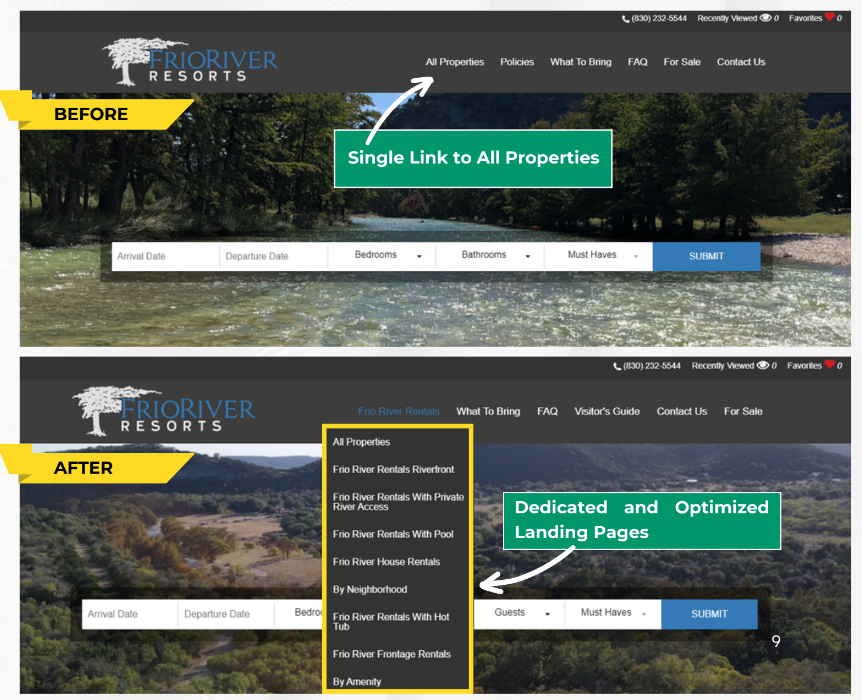
- Broad Visibility for Your Portfolio: Implementing SEO strategies transcends merely elevating your homepage in Google search rankings. By crafting landing pages focused on specific keywords, such as “Pet-Friendly Rentals” and “Oceanfront Rentals,” you amplify the visibility of individual properties in your portfolio. Building these targeted pages expands the keywords you rank for on Google and boosts the likelihood of potential customers discovering the wide range of accommodations you offer.
- Gain a Competitive Edge in Your Market: The vacation rental industry is fiercely competitive. Effective SEO puts your properties in front of potential guests at the critical moment of their search for the perfect vacation rental.
- Quality Traffic Over Quantity: By targeting specific keywords relevant to your properties and destinations, you can bring in traffic with higher booking potential
SEO Directly Impacts Your Growth
- Direct Bookings: Higher search engine rankings mean more direct bookings on your website, reducing your reliance on third-party listing websites and improving your margins.
- Brand recognition: Consistently appearing in search results builds brand awareness and trust, encouraging repeat bookings and referrals.
Implementing an SEO strategy is not optional for vacation rental managers—it’s essential. It’s the key to ensuring each property gains maximum online exposure, attracts more qualified leads, and achieves higher occupancy rates. Let’s explore some actionable SEO strategies you can deploy via your CMS.
It Begins with Keywords
SEO strategies are built on a crucial foundation: keywords. These are the terms that potential guests use when searching for vacation rentals like yours, making them the key to unlocking your inventory’s online potential.
Simple Keyword Research Tactics for Non-Experts
Don’t be intimidated by the prospect of keyword research without SEO expertise or specialized tools. With a handful of uncomplicated techniques, you can uncover the terms your audience uses when searching for vacation rentals like yours. The key is to understand your audience and make the most of the resources at your disposal.
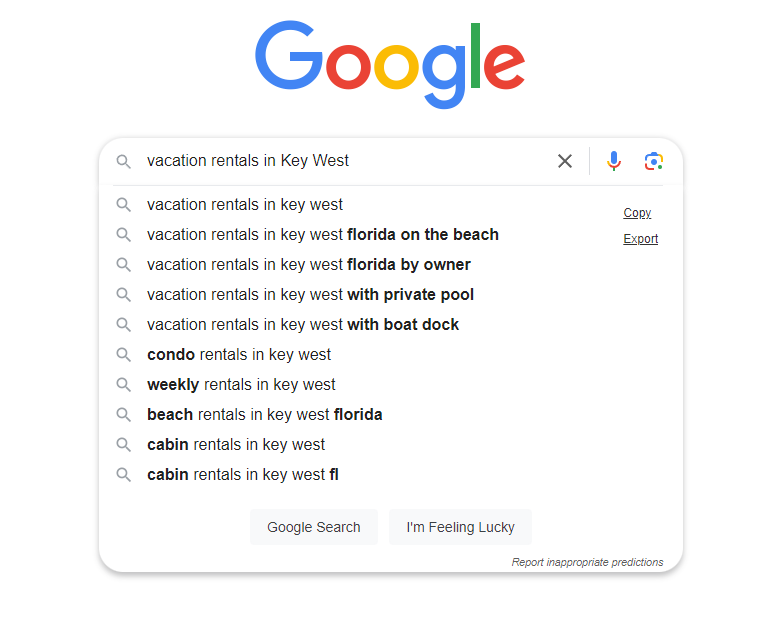
- Start with Google Search: Type in phrases related to your vacation rental, such as “vacation rentals in [Location]” or “[Location] vacation homes,” and note the autocomplete suggestions. These suggestions reflect standard search terms used by others. Additionally, scroll down to the bottom of the search results page to find the “Searches related to” section for more keyword ideas.
- Leverage Social Media: Platforms like Twitter, Instagram, and Pinterest can be goldmines for keyword discovery. Look for hashtags and phrases commonly used in posts about vacation rentals or travel in your area. These keywords can provide insights into potential guests’ language and terms.
- Analyze Your Competitors: Visit the websites of other vacation rentals in your area. Observe their language in their headlines, property descriptions, and blog posts. Their word choice can give you a sense of their target keywords, which may also be relevant to your properties.
- Ask your guests: Don’t underestimate the power of direct feedback. Ask them how they found your property or what terms they would use to search for a vacation rental like yours. This real-world input can provide invaluable insights into the search behavior of your target audience.
With these straightforward keyword research strategies, you can select relevant terms that resonate with your target audience and weave them into your website’s content. The aim is to mirror the language of your ideal guest, creating engaging and informative content that perfectly aligns with their search habits and preferences.
Once you have the target keywords from your research, the next step in executing your SEO strategy involves your Content Management System (CMS).
Utilizing Your Content Management System (CMS) for SEO
The first part of our SEO game plan focuses on three key areas that you can quickly execute via your website’s content management system (CMS) – aka the backend of your website. Think of it as your website’s control panel. It lets you publish, edit, and manage your website’s content without writing code. You typically access your CMS through a portal provided by your website host.
If ICND hosts your website, you can access your CMS through the link we provided. Another popular website platform, WordPress, typically requires you to access its CMS through the /wp-admin portal. No matter what system you use, you can edit content on your website. It’s 2024, everyone has this!
Optimizing Title Tags and Meta Descriptions
Title Tags
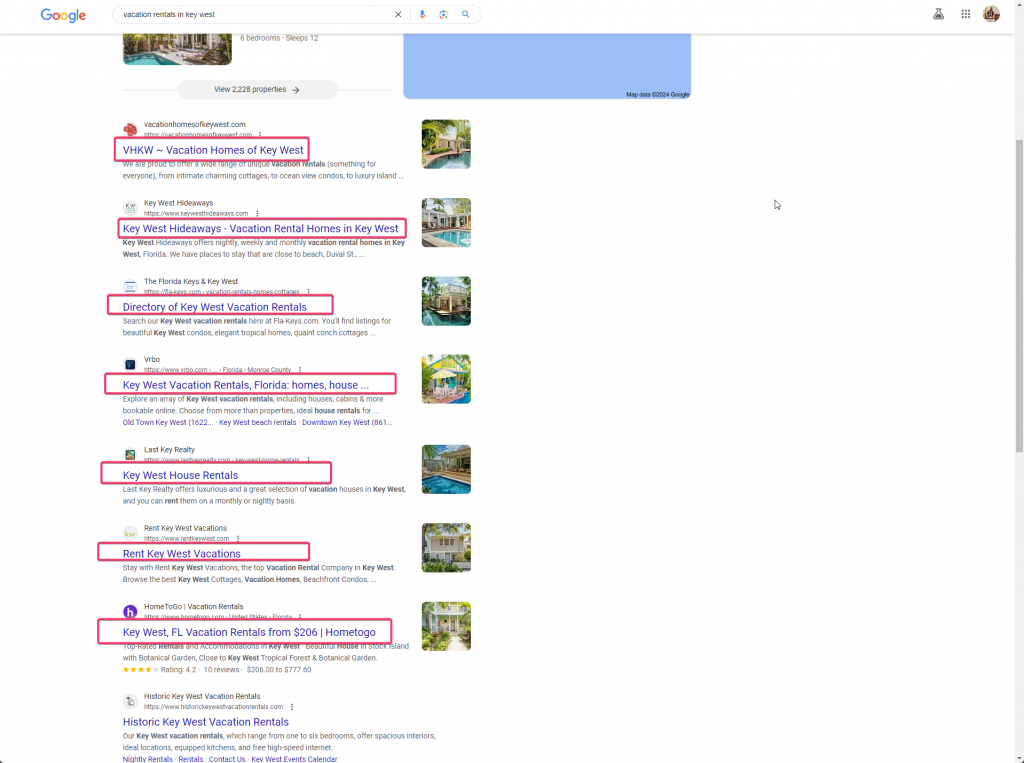
Your title tags are the clickable headlines that appear in Google search results. You want to ensure that each page on your website has a unique and descriptive title tag incorporating relevant keywords. With appropriate and keyword-focused title tags, you have a better chance of higher rankings on Google and encourage guests to click through to your website.
Updating a page’s title tag is simple and usually accessible through your CMS’s page settings. Look for a section labeled ‘SEO,’ ‘Page Settings,’ or ‘Title Tags.’ You can easily edit the title from there to include your target keywords. Remember, each CMS may have a slightly different interface, so consulting your CMS’s documentation will provide more detailed guidance.
When crafting your title tags for your website, keep these best practices in mind:
- It’s crucial to be descriptive and concise. Aim for a precise page content description, keeping the title tag under 60 characters. This character length ensures that your title tags display correctly in Google search results, maximizing their effectiveness.
- Include your primary keyword(s) for the page you’re building in your title, and do so at the beginning. Again, try to ensure that it still reads naturally.
- If you can stay within the recommended character count, consider adding your brand to the end of your title tag (“Luxury Rentals with Private Pools | VillaRentals LLC”).
Here are some examples of title tags we have crafted at ICND for our clients:
- Wrightsville Beach Rentals | Vacation Homes & Condos Wrightsville Beach Condo Rentals | Oceanfront, With Pool, & More
- Carolina Beach Rentals | Oceanfront Condos, Beach Homes, & More
- NC Beach Rentals With Pools | 70+ Vacation Rentals
Meta Descriptions
While it doesn’t directly impact your Google rankings, having a concise and well-crafted description of your webpage can improve the click-through rates of people searching for vacant properties in your area. Your description should be between 120 and 158 characters for the best results. You can write longer descriptions, but Google will truncate them in its search results.
To edit your meta descriptions, you will typically follow the same procedure for updating title tags within your CMS. Navigate to the same “SEO,” “Page Settings,” or “Meta Descriptions” area where you edited your title tags. This section of your CMS is where you can add your concise, attention-grabbing meta descriptions.
Meta Description Best Practices
- Write clear and enticing descriptions that promise the value guests are seeking. Mention essential amenities or your portfolio’s unique selling points.
- Encourage clicks by starting with action verbs (e.g., “Discover,” “Experience,” “Enjoy”) and create a sense of urgency or excitement.
- Like your meta titles, you should incorporate your target keywords for that page in your meta description. Having keywords in your meta description lets Google match your page with users’ search queries, making your page more relevant.
Here are some examples of well-crafted meta descriptions:
- Discover exceptional Anna Maria Island rentals with AMI Locals. Explore pristine beaches, top attractions, and dream escapes in paradise. Book now!
- Browse the largest selection of Pawleys Island Vacation Rentals on the SC coast. Book the perfect Pawleys Island oceanfront vacation rental today!
Use Heading Tags for Structure
Heading Tags (H1, H2, H3, etc.): Use headlines to help organize the content on your pages. The H1 tag must be the page’s main title, for example, “Oceanfront Rentals in Myrtle Beach.” From there, you will use H2 headlines for subheadings like amenities and location details. With structured headings in place, you improve the readability for users and help Google understand your content and its importance.
Adding Keywords to Your Content
Keyword integration: Integrating keywords relevant to your properties, location, and amenities is fundamental to achieving higher Google rankings. Use your CMS to ensure you are weaving target keywords into your website’s content, including property descriptions, blog posts, and amenities category pages. However, it’s essential to avoid “keyword stuffing.” We want the content to be natural and engaging for the reader while still being optimized for Google.
A Few More CMS Tools to Optimize Your SEO
URL Structure: Use your CMS to create descriptive and clean URLs for each page on your website. Clear and concise URLs improve the user experience and help Google understand your content when crawling and indexing. But it also helps to include keywords!
Here are some examples of how we have incorporated keywords into the URLs of pages we have created:
- https://www.lastkeyrealty.com/key-west-home-rentals
- https://www.amilocals.com/anna-maria-island-pet-friendly-rentals
- https://seasidevacations.com/north-myrtle-beach-winter-rentals
Note: There may be nothing you can do to alter your URL structure, but if you can, do it.
Image Optimization: Uploading images through your CMS allows you to add descriptive and keyword-rich file names and alt text to the images. This strategy not only aids in Google indexing but is also critical to website accessibility.
Utilizing the power of your CMS for SEO is a vital foundation for an effective and profitable SEO strategy. Now, let’s look at what we can do with your Google Business Profile listing, which is crucial for your website’s local visibility.
Leveraging Your Google Business Profile for Local SEO
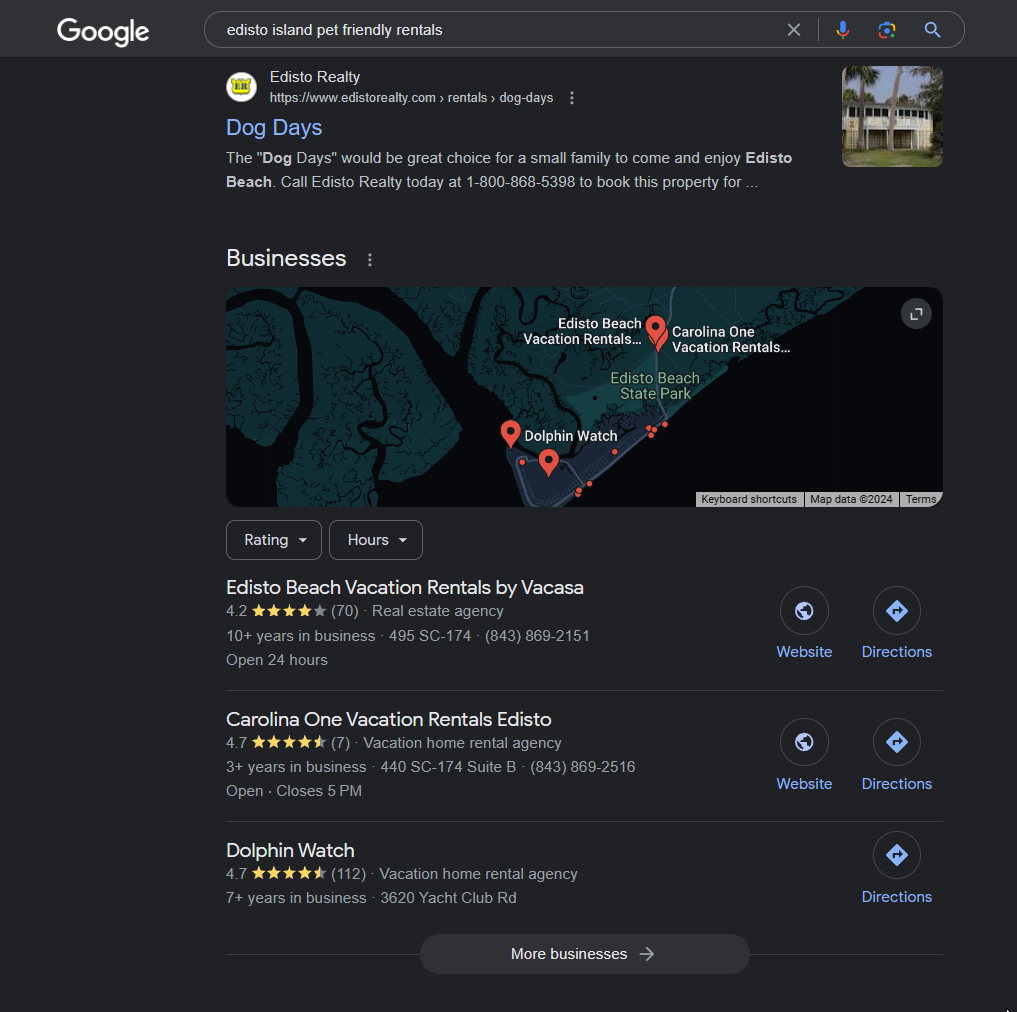
Google Business Profile, formerly Google My Business, is an indispensable tool for enhancing your company’s Local SEO strategy. An optimized profile does more than list your business; it significantly influences how your business and website appear on Google Maps and local search results, directly affecting your online visibility and guest engagement.
Understanding the Role of Google Business Profile in Vacation Rental Success
Why is a Google Business Profile crucial to your SEO strategy? An optimized profile creates increased visibility, trust, and a more substantial local presence. These benefits attract potential guests and convince them to book with you.
Visibility: A properly optimized profile puts your website in the spotlight of local searches, ensuring that guests see your properties exactly when looking for accommodations in your region.
Trust: Profiles with complete information and positive reviews build trust with potential guests. Gaining the trust of your guests is paramount to getting them to book.
Local SEO: Your Google Business Profile is the lynchpin of your local SEO strategy. Having a complete and optimized profile helps Google understand more about your business, which can, in turn, improve your overall search ranking.
Optimizing Your Google Business Profile for Local SEO
- Claim your listing: This is your first step if you haven’t already claimed your listing on Google. Look up your business on the Google Business Profile page: https://bit.ly/3xabxWF. If your company doesn’t appear in the search results, Google will ask you to create a new listing. Google will guide you through the process of creating your Google Business Profile.
- Verify Your Business: To confirm ownership, Google will require verification. The most straightforward method will be to let Google call the phone number listed on your profile.
- Complete Your Profile: Complete every section of your Google Business profile thoroughly. That includes your business name, principal office address, all necessary contact information, website URL, and office hours. Having comprehensive details ensures potential guests have all the information they need.
- Add photos and videos: Your listing can be enhanced with high-quality images and videos. Visuals are a critical component in capturing the interest of potential guests. Having them on your Google Business Profile lets you show off your properties before guests visit your website.
- Choose Relevant Business Categories: choose the categories that best represent the types of properties you rent and the services that you offer. Business categories are another signal that helps Google understand your business and display your profile in relevant search queries.
- Incorporate Keywords: Using relevant keywords on your Google Business Profile is as essential as using them on your website. Incorporate your target keywords into appropriate profile sections and use them in any updates you post. Using targeted keywords boosts your visibility in search results, which draws more attention to your profile and website.
With your Google Business Profile optimized you’re well on your way to enhancing your local SEO and attracting more bookings. The next crucial step is harnessing customer feedback.
Encouraging Guests to Leave Reviews and How to Respond to Them
The power of guest reviews on your profile goes beyond just testimonials; it’s another component of our local SEO strategy.
Encourage Reviews: Encourage your guests to leave reviews by following up with emails, text messages, and thoughtful notes in your welcome packets. These reviews reflect the impeccable quality of your service and signal to Google the active engagement and popularity of your business.
Respond to Reviews: Your team must become accustomed to responding thoughtfully and thoroughly to incoming reviews. By thanking guests for positive feedback and addressing any negative experiences, you demonstrate a commitment to guest satisfaction.
Soliciting and responding to reviews as part of your SEO strategy builds trust with potential guests and bolsters your visibility in local Google search results, which drives more bookings for you and your properties.
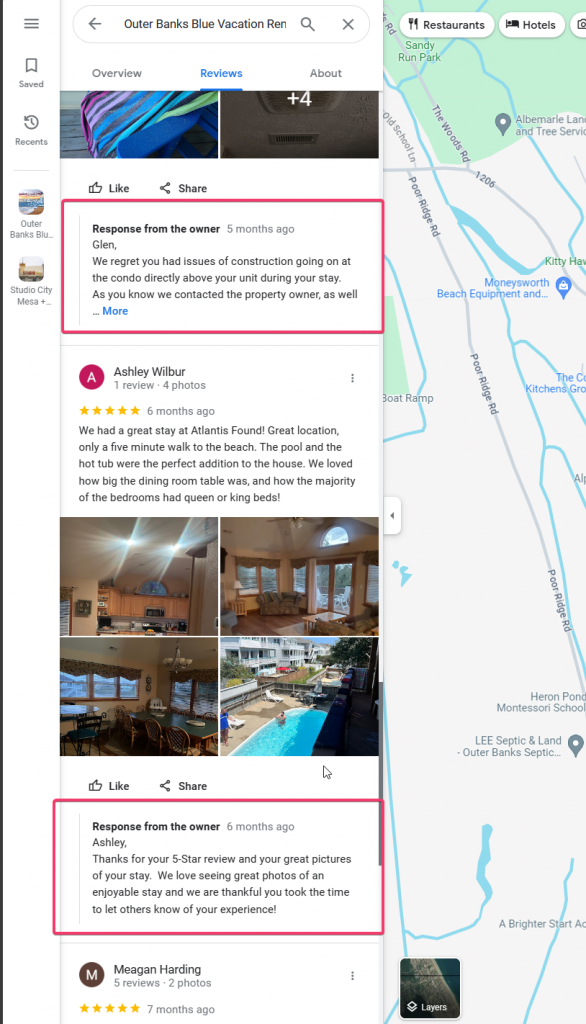
Taking charge of your Google Business Profile is a straightforward and powerful way to boost your SEO and drive bookings directly. By setting up and actively managing your profile—alongside leveraging guest feedback—you improve your website and rental properties’ visibility in local searches and build a more robust, trust-based connection with potential guests.
SEO Doesn’t Have to be A Black Box – You Can Do It Too
The above are the basics, but hundreds of factors determine how a website is run. You aren’t going to get there overnight, and maybe not even within the first year. Once you start to get serious, I highly recommend checking out Paul Hanak’s “Truth About Vacation Rental SEO” video on YouTube (linky link) for more insights.
The ability to improve your online visibility through SEO isn’t reserved for the experts alone. The strategies shared here are practical, easy-to-implement steps that don’t require technical knowledge or specialized tools, from optimizing title tags and meta descriptions in your content management system (CMS) to claiming and optimizing your Google Business Profile for local SEO. These are all steps you can start on your own today to make a tangible difference.
Anyone can make consistent, straightforward efforts to increase their visibility on Google. It’s an ongoing journey, but starting with these first steps will set you on the right path to success. Optimizing your website and online profiles will increase your rankings and lead to more direct bookings.
Remember, the most significant strides often come from taking the first step!
 866.249.6095
866.249.6095